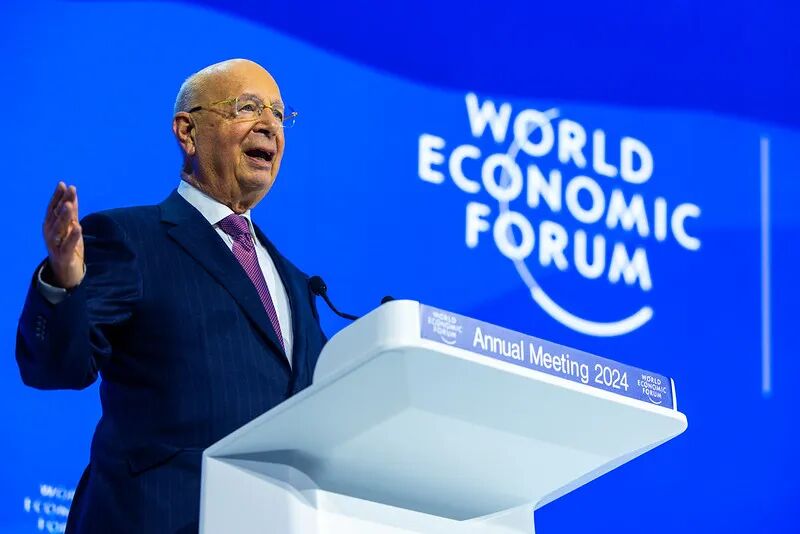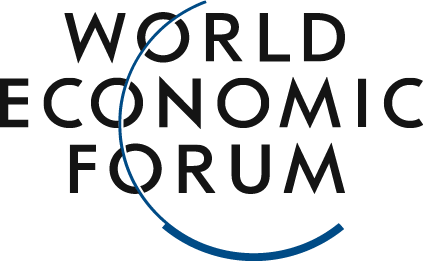Klaus Schwab
Founder and Executive Chairman of the World Economic Forum
This article was originally published inChina Cybersecurity Review, Issue 4, 2024
The immense power generated by the Fourth Industrial Revolution is reshaping societal structures and industries across nations in ways previously unimaginable. From smart factories and self-driving vehicles to personalized medicine and beyond, this transformative wave is leveraging cutting-edge technologies like artificial intelligence, the Internet of Things, robotics, and big data to create hyper-efficient, highly responsive, and increasingly adaptive interconnected systems—designed to better meet humanity's evolving needs.
The seamless integration of the digital and physical worlds is driving unprecedented productivity gains, fueling innovation, and fundamentally redefining how people live and work. Yet, to realize the technological vision of improving humanity’s future—and to ensure that the benefits of these innovations are continuously accumulated and equitably shared—we must foster collaborative efforts between public and private sectors, backed by strategic planning and visionary leadership.
If technological progress is guided by principles of inclusivity and sustainability, it can help bridge existing gaps, opening doors for underserved communities and ensuring that everyone—from marginalized groups to the broader population—has access to vital information and resources. Ultimately, this approach will pave the way for a thriving, sustainable global community that leaves a legacy of prosperity and opportunity for generations to come.
To make this vision a reality, we must act collectively, investing in robust digital infrastructure that serves as the bedrock for enduring societal growth and development—empowering humanity to build a brighter, more resilient future for all.
Strengthen global cooperation to enhance cybersecurity.In today’s era, digital transformation is continuously reshaping every aspect of our lives—ranging from how we work to how we communicate. As a result, we absolutely cannot afford to underestimate the critical importance of cybersecurity. The World Economic Forum’s *Global Risks Report 2024* highlights that cybersecurity challenges have emerged as a cross-regional, global threat. Complex risks such as malware, deepfakes, and inequities in cyber resilience are creating insurmountable obstacles for supply chains, financial stability, and even democratic processes. Meanwhile, as public awareness of online risks continues to grow, opportunities for enhanced collaboration on digital and cyberspace security are steadily expanding. Our collective ability to tackle these pressing issues has become our greatest asset in addressing the rapidly evolving array of threats and challenges we face. These include escalating risks driven by deepening digital inequalities, widening gaps in cybersecurity expertise, and the need for forward-thinking strategic planning to navigate the challenges posed by emerging technologies like artificial intelligence and quantum computing.Established in 2018, the World Economic Forum’s Center on Cybersecurity has played a pivotal role by providing an independent and impartial platform for focused discussions on the strategic global importance of cybersecurity. The Center’s mission is to foster collaboration between the public and private sectors, address systemic challenges, and ensure that the safety of individuals and organizations remains integral to the broader landscape of digital and technological advancement. To date, the Center has coordinated more than 100 sessions on critical cyber-related topics during its annual Cybersecurity Summit, while also facilitating key discussions at the World Economic Forum’s Annual Meeting. Additionally, it has successfully launched a series of influential frameworks and reports, including its flagship publication, the "Global Cybersecurity Outlook"—now in its fourth year of release.One of the core objectives of the Cybersecurity Center is to develop and expand forward-thinking solutions, promoting effective practices within the digital ecosystem to further enhance cyber resilience. Recognized by stakeholders across various sectors, the Center has spearheaded numerous groundbreaking initiatives focused on cyber resilience, actively contributing to the development of relevant national regulations. Today, the Cybersecurity Center has integrated cutting-edge thinking and proven cyber-resilience strategies into industries spanning energy, manufacturing, supply chains, and transportation.
For instance, the Center launched the "Cyber Resilience System for the Power Sector" initiative, bringing together Chief Information Security Officers from leading global power operators and manufacturers. This effort centers on strengthening supply chain incident response capabilities and advancing the secure application of emerging technologies. It also clarifies the critical role of CISOs in the power industry while advocating for interoperability across global regulatory frameworks—goals that ultimately aim to bolster the entire ecosystem’s ability to withstand cyber threats.
A standout example of this initiative’s impact is the European Union’s recent request to the World Economic Forum’s "Power Sector Cyber Resilience" community. The EU has asked the community to provide recommendations on how to improve cybersecurity legislation, helping inform the development of the EU’s upcoming policy: the Network and Information Security Directive 2 (NIS 2.0).
Currently, the Cybersecurity Center is actively driving multiple initiatives, implementing unified strategies across key sectors such as oil & gas, manufacturing, supply chains, and transportation—each designed to fortify the resilience of these industries’ critical digital systems.In 2020, the World Economic Forum released several recommendations on the "Partnership to Combat Cybercrime," outlining a roadmap for strengthening collaboration between the private sector, law enforcement agencies, and civil society organizations. These recommendations detailed key principles for fostering public-private partnerships aimed at jointly tackling cybercrime, while also proposing collaborative action plans designed to dismantle the cybercrime ecosystem. During the World Economic Forum Annual Meeting in January 2023, the four partners of the "Partnership to Combat Cybercrime" joined forces to launch a concrete action plan within the forum’s framework. This initiative seeks to leverage public-private collaboration to effectively identify cybercrime ecosystems, test the proposed recommendations, and scale up their implementation across the alliance.As the Cybersecurity Center continues to evolve, its achievements will increasingly highlight the critical role of international cooperation in addressing global cybersecurity challenges—and will further underscore the pivotal impact of various collaborative initiatives in delivering tangible results and broader influence.Artificial Intelligence, Digital Inclusion, and the Fourth Industrial RevolutionThe World Economic Forum’s Center on the Fourth Industrial Revolution serves as a global collaboration hub, bringing together governments, businesses, civil society organizations, and leading experts from around the world to co-create and implement forward-thinking approaches to technology governance. The center is dedicated to championing the societal benefits of technological advancement while minimizing the risks associated with the unchecked spread of emerging technologies. At its core, the Center on the Fourth Industrial Revolution is committed to accelerating the adoption of cutting-edge innovations in an inclusive and empowering manner—ensuring that groundbreaking technologies ultimately contribute to making the world a better place.As a transformative force reshaping the innovation landscape, artificial intelligence is delivering entirely new solutions to tackle complex societal challenges. In the healthcare sector, advanced AI is sparking a revolutionary shift in diagnosis and treatment, promising early disease detection, personalized therapies, and accelerated drug development. Meanwhile, AI is also playing a vital role in environmental conservation, offering critical support in areas such as ecosystem monitoring, climate prediction, sustainable management of natural resources, fostering long-term sustainability, and enhancing disaster preparedness. In education, groundbreaking AI advancements hold the potential to create more tailored learning experiences—customizing content to align with individual learning styles and diverse needs—while simultaneously expanding access to quality education and boosting its overall effectiveness.In terms of social inclusion, artificial intelligence is helping people with disabilities break down barriers to societal integration. For instance, innovative solutions like image-to-sound object recognition tools are emerging, better addressing the needs of blind and low-vision individuals in interpreting information from their surroundings.From an economic perspective, artificial intelligence could emerge as a new driver of economic growth, boosting productivity across industries, unlocking access to new markets, and reshaping the employment landscape by introducing fresh skill demands while simultaneously creating innovative job opportunities. Meanwhile, the public sector will leverage AI to enhance operational efficiency and responsiveness, ultimately delivering improved services to citizens and communities.However, deploying artificial intelligence also comes with challenges. Issues such as privacy, bias, inclusivity, and accountability must be carefully addressed to ensure that AI is used responsibly and effectively in tackling some of society's most pressing challenges.To this end, the World Economic Forum has launched several key action initiatives aimed at promoting the implementation of prudent governance mechanisms, ensuring that everyone can share in the benefits of the digital economy's growth. Among these, three noteworthy initiatives stand out: the "AI Governance Alliance," the "EDISON Alliance," and the "Digital Trust" initiative.The AI Governance Alliance is a collaborative platform designed to bring together the strengths of industry, government, academia, and civil society organizations, guiding the responsible design, development, and deployment of AI systems on a global scale. With over 270 members from diverse organizations, the Alliance is committed to fostering a multi-stakeholder community that addresses complex AI governance challenges through structured strategies—while placing a strong emphasis on shared accountability and proactive risk management throughout the entire AI lifecycle. This initiative underscores the importance of aligning AI advancements with ethical principles as well as the diverse values and needs of society.The Edison Alliance is focused on accelerating digital inclusion across industries such as healthcare, finance, and education. A key goal of the alliance is to provide affordable digital solutions to one billion underserved people worldwide. As of January 2024, the alliance has already launched 320 action initiatives in 127 countries, reaching 784 million individuals. Additionally, the alliance serves as a collaborative platform for partners, enabling them to scale existing digital inclusion efforts and forge new strategic partnerships. By expanding broadband network coverage in underserved regions, the alliance is also working to enhance digital literacy and bridge the gap between adoption rates and usage of digital technologies.The "Digital Trust" initiative is dedicated to building a secure and trustworthy digital environment, encouraging the ethical and responsible use of technology to enable all users to engage in safe, reliable, and meaningful digital interactions. Focusing on critical issues such as cybersecurity, privacy, and digital identity, the initiative aims to enhance trust within the broader digital ecosystem. By actively participating in the development and promotion of guidelines, policies, and best practices related to digital trust, the initiative seeks to strengthen decision-making around emerging technologies, foster greater inclusivity and participation in the digital economy—particularly by empowering underrepresented and vulnerable groups to fully engage in the digital marketplace.All three of the above action initiatives are designed to fulfill a broader commitment: leveraging digital technologies in ways that foster greater inclusivity and build trust. By addressing both the challenges and opportunities of the digital age, these initiatives aim to advance the idea that everyone—regardless of region, economic status, or social standing—can benefit from the transformative innovations of the Fourth Industrial Revolution.China's Digital Evolution and Prospects for CooperationOver the past three decades, China’s remarkable progress in expanding internet access has sparked a socio-economic revolution. This transformation has propelled China from an emerging digital powerhouse to one of the world’s leading digital hubs, vividly demonstrating the immense transformative power of connectivity and innovation. Widely accessible internet in China has democratized information, opening doors to education, healthcare, and economic opportunities that were once out of reach for many. Such an inclusive digital landscape has nurtured a new generation of entrepreneurs and innovators, bolstering China’s standing in the global economy while significantly narrowing the digital divide within the country. At the same time, this model serves as a shining example for nations around the world.China's rise in the digital realm is primarily characterized by its innovative approach to driving technological advancement, enhancing tech governance, and safeguarding cybersecurity—actions that have profoundly influenced the global digital ecosystem. By taking the lead and making significant strides in areas such as 5G, artificial intelligence, and e-commerce, China has not only reshaped its own economic and social structures but also shared invaluable insights and cutting-edge technologies with the world. Moreover, China's uniquely tailored digital governance model—and its unwavering commitment to cybersecurity—demonstrate how the country has adopted a "tailor-made" strategy to navigate both challenges and opportunities in today's rapidly evolving global landscape.Specifically in the field of artificial intelligence, Chinese President Xi Jinping announced at the third Belt and Road International Cooperation Summit in October 2023 that China would propose a Global AI Governance Initiative. He emphasized China’s commitment to fairness and non-discrimination in AI development, stressing that AI advancements should benefit people across all nations and regions. At the World Economic Forum’s 2024 Annual Meeting, Chinese Premier Li Qiang highlighted AI’s critical role and called for a human-centered approach, ensuring that AI evolves in ways that advance human civilization. These statements underscore China’s dedication to fostering international collaboration, while also positioning AI as a tool designed to serve the global public good—and actively promoting inclusive AI governance frameworks.As we embark on the journey toward a digital future, there has never been a greater need than today for collaboration that transcends borders, industries, and cultures. The rapid evolution of digital technologies has unlocked unprecedented global opportunities—while simultaneously giving rise to far-reaching, globally impactful challenges. This underscores the urgent necessity for the international community to join forces and tackle critical issues together, including governance, innovation, and security.
In this shared global vision, China is not just an active participant—it stands as a pivotal leader and innovator. China’s experiences and achievements are indispensable to humanity’s collective progress. Committed firmly to bridging the digital divide, enhancing digital literacy, and fostering the growth of the global digital economy, China has set a powerful example for achieving true digital inclusion.
If all stakeholders come together, leveraging their unique strengths and contributing valuable insights, we can build a more resilient, secure, and equitable digital future—one that benefits everyone.Global collaboration between the public and private sectors is essential to navigate the complexities of our digital future and shape the broader trajectory of technological advancement. At the heart of the World Economic Forum’s mission lies the critical task of fostering and coordinating this indispensable partnership, bringing together leaders from government, business, civil society, and academia to tackle the multifaceted challenges—and seize the opportunities—arising from rapid technological progress. By facilitating dialogue, sharing insights, and co-creating innovative solutions, the World Economic Forum can play a pivotal role in ensuring that the Fourth Industrial Revolution benefits society as a whole, while simultaneously promoting inclusivity, trust, and sustainable development in an increasingly interconnected world.Editor: Wang Can
The World Economic Forum is an independent and neutral platform dedicated to bringing together diverse perspectives to discuss critical global, regional, and industry-specific issues.
Follow us on Weibo, WeChat Video Channels, Douyin, and Xiaohongshu!
"World Economic Forum"




